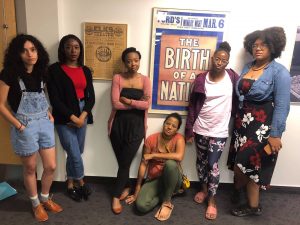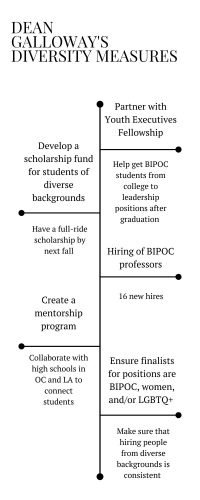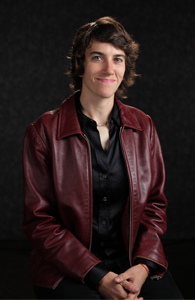
The promise of prosperity is one that every leader makes. However, since his appointment to the position in March, Dean Galloway has made what even skeptics recognize as real strides in his commitment to diversity. With the launch of many new initiatives, including the hiring of Black, Indigenous, and people of color (BIPOC) professors, Galloway is adamant on making Dodge a much more inclusive place.
“Diversity is important, I think on so many levels. One is, it’s right. It’s right to open the doors for everybody,” Galloway said.

The history of diversity at Chapman University’s film school is rocky. In March of 2019, the controversial debate over the “Birth of a Nation” poster came to a head. Arri Caviness, a recent Dodge alum, was the first voice to speak up about the movie poster.
In a tweet, Caviness pointed out the absurdity of having a poster of a film that promotes white supremacy on campus.
What followed was protests and demands from students, especially from those in the Black Student Union on campus. Even after the poster was taken down, with much hesitation from the pre-Galloway Dodge administration, Caviness faced months of repercussions.
“We spent a large chunk of that semester with the poster debacle weighing on us, when we should have been able to focus on our classes,” Caviness said. “I’m just hoping that current and future students don’t have to fight as hard as we did to see positive change.”

And according to Dean Galloway, students won’t have to fight at all. After the new wave of momentum for the Black Lives Matter movement in late May, Galloway released a statement that outlines four specific goals for increasing diversity in Dodge. Checking in on these promises, Galloway ensures that all is going well.
“We hired 16 lecturers of color. 11 of them were Black, 9 of them were women,” Galloway said. “I’ve already hired 2 Black professors and I’m hoping to hire 2 more by the fall which will take us from having 1 Black professor to having either 4 or 5 full-time Black professors.”
While this is a step in the right direction, there are still concerns that this will not be enough.
“This also needs to be coupled with efforts to make Dodge a place that a Black person would want to work at,” said Sarah Marinello in the comments of the Dean’s Instagram post. “After you hire these people, what are you going to be doing to ensure they have a supportive work environment?”
In terms of the dean’s other promises, Dodge has partnered with Spotify and a producer of The Big Bang Theory to create a full-ride scholarship. This should be ready to offer as early as next fall. Also, a mentorship program between high school students in Orange County and Los Angeles, and students at Dodge has secured some partnerships.
After eight months in the position, all of which have been while juggling COVID-19 issues, Dean Galloway has put his money where his mouth is and taken real steps to improving diversity at the college.
The effects of his leadership are being felt around the college as well. Professor Sally Rubin, the program coordinator for the Broadcast Journalism and Documentary Film program, is the first to admit that she has seen change already. As someone who has worked at Dodge for over 10 years, Rubin has seen the shift in students and the growing need for more representation in all aspects of the school.

Rubin echoes Galloway’s thoughts on the importance of diversity, noting how students need to see themselves in their professors. She wholeheartedly agrees with the idea of “if you can see it, you can be it” and wants every student to be able to have a role model like that in the classroom.
As a woman in the LGBTQ+ community, Rubin knows how hard it can be for students in minority groups to feel seen and heard. That is why she has been so impressed by Dean Galloway’s response. Rubin was part of the diversity committee that Galloway created and she has seen how committed he is.
“It wasn’t just him issuing grand statements like, I want more diversity. It was very, very specific. How are we going to do this? Who’s making those phone calls?” Rubin said.
Though the staff are seeing all the steps being taken by Dean Galloway, students hear less about it and are more insistent on the change. When Galloway’s post went up in June, the general reaction was very positive. However, there were students that voiced their concern that these are only first steps, and much more needs to be done.
Danielle Gibson, a third year Film Production MFA student, spoke about how she’s seen Galloway’s effect on the school. Though she has not seen major changes yet, she does have some ideas for educational changes that need to happen.
“It’s hard to say since he took over right as the pandemic hit… I’m told he’s bringing in more diverse faculty, which is a fantastic idea,” Gibson said. “I just wish there was a better way to educate people on how to recognize casual racism interpersonally and in representation in the media.”
This sentiment is echoed across the comments section of Dean Galloway’s post, with many hesitant to believe that real change is happening. The mindset of I’ll believe it when I see it is a common mentality in Dodge students. After being burned too many times in their expectations for change, students are much more hesitant now.

With so few students taking classes with these newly hired professors, all of this work seems to go missing in the student eye. Until systemic issues at the core of Dodge are addressed, diversity, equity, and inclusion, will still be a problem.
“As a woman of color I feel like I’m more easily judged for what I say or think, especially when it comes to diversity or speaking out against racism,” Gibson said. “I don’t always feel like people [students, professors] take me as seriously as my white, male colleagues.”
Microaggressions, lack of education, and an unwillingness to change on a personal level will make Dodge students, staff, and faculty, the reason why Dodge is not progressing; not because the administration does not want to implement change.
Professor Rubin noted: “If you have to take an elective, or a secondary, or a sort of exception class to see yourself in what’s being shown to you, you feel like an exception. You feel secondary.”
